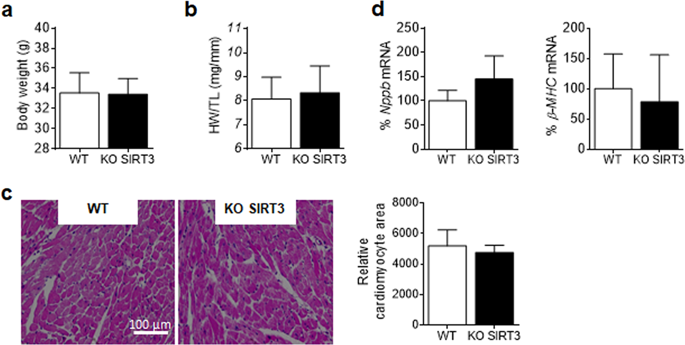当前位置:
X-MOL 学术
›
Signal Transduct. Target Ther.
›
论文详情
Our official English website, www.x-mol.net, welcomes your feedback! (Note: you will need to create a separate account there.)
SIRT3-mediated inhibition of FOS through histone H3 deacetylation prevents cardiac fibrosis and inflammation.
Signal Transduction and Targeted Therapy ( IF 39.3 ) Pub Date : 2020-02-28 , DOI: 10.1038/s41392-020-0114-1 Xavier Palomer 1 , M Silvia Román-Azcona 1 , Javier Pizarro-Delgado 1 , Ana Planavila 2 , Francesc Villarroya 2 , Brenda Valenzuela-Alcaraz 3 , Fátima Crispi 3 , Álvaro Sepúlveda-Martínez 3 , Irene Miguel-Escalada 4 , Jorge Ferrer 4, 5 , J Francisco Nistal 6 , Raquel García 7 , Mercy M Davidson 8 , Emma Barroso 1 , Manuel Vázquez-Carrera 1
Signal Transduction and Targeted Therapy ( IF 39.3 ) Pub Date : 2020-02-28 , DOI: 10.1038/s41392-020-0114-1 Xavier Palomer 1 , M Silvia Román-Azcona 1 , Javier Pizarro-Delgado 1 , Ana Planavila 2 , Francesc Villarroya 2 , Brenda Valenzuela-Alcaraz 3 , Fátima Crispi 3 , Álvaro Sepúlveda-Martínez 3 , Irene Miguel-Escalada 4 , Jorge Ferrer 4, 5 , J Francisco Nistal 6 , Raquel García 7 , Mercy M Davidson 8 , Emma Barroso 1 , Manuel Vázquez-Carrera 1
Affiliation

|
Sirtuin 3 (SIRT3) is a deacetylase that modulates proteins that control metabolism and protects against oxidative stress. Modulation of SIRT3 activity has been proposed as a promising therapeutic target for ameliorating metabolic diseases and associated cardiac disturbances. In this study, we investigated the role of SIRT3 in inflammation and fibrosis in the heart using male mice with constitutive and systemic deletion of SIRT3 and human cardiac AC16 cells. SIRT3 knockout mice showed cardiac fibrosis and inflammation that was characterized by augmented transcriptional activity of AP-1. Consistent with this, SIRT3 overexpression in human and neonatal rat cardiomyocytes partially prevented the inflammatory and profibrotic response induced by TNF-α. Notably, these effects were associated with a decrease in the mRNA and protein levels of FOS and the DNA-binding activity of AP-1. Finally, we demonstrated that SIRT3 inhibits FOS transcription through specific histone H3 lysine K27 deacetylation at its promoter. These findings highlight an important function of SIRT3 in mediating the often intricate profibrotic and proinflammatory responses of cardiac cells through the modulation of the FOS/AP-1 pathway. Since fibrosis and inflammation are crucial in the progression of cardiac hypertrophy, heart failure, and diabetic cardiomyopathy, our results point to SIRT3 as a potential target for treating these diseases.
中文翻译:

SIRT3 介导的 FOS 抑制通过组蛋白 H3 去乙酰化可防止心脏纤维化和炎症。
Sirtuin 3 (SIRT3) 是一种去乙酰化酶,可调节控制代谢和防止氧化应激的蛋白质。SIRT3 活性的调节已被提议作为改善代谢疾病和相关心脏紊乱的有希望的治疗靶点。在这项研究中,我们使用具有组成性和系统性缺失 SIRT3 和人心脏 AC16 细胞的雄性小鼠研究了 SIRT3 在心脏炎症和纤维化中的作用。SIRT3 敲除小鼠表现出心脏纤维化和炎症,其特征是 AP-1 的转录活性增强。与此一致,人类和新生大鼠心肌细胞中的 SIRT3 过表达部分阻止了由 TNF-α 诱导的炎症和促纤维化反应。尤其,这些影响与 FOS 的 mRNA 和蛋白质水平以及 AP-1 的 DNA 结合活性降低有关。最后,我们证明了 SIRT3 通过其启动子处的特定组蛋白 H3 赖氨酸 K27 脱乙酰化抑制 FOS 转录。这些发现强调了 SIRT3 在通过调节 FOS/AP-1 通路介导心脏细胞通常复杂的促纤维化和促炎反应方面的重要功能。由于纤维化和炎症在心脏肥大、心力衰竭和糖尿病性心肌病的进展中至关重要,我们的结果表明 SIRT3 是治疗这些疾病的潜在靶点。这些发现强调了 SIRT3 在通过调节 FOS/AP-1 通路介导心脏细胞通常复杂的促纤维化和促炎反应方面的重要功能。由于纤维化和炎症在心脏肥大、心力衰竭和糖尿病性心肌病的进展中至关重要,我们的结果表明 SIRT3 是治疗这些疾病的潜在靶点。这些发现强调了 SIRT3 在通过调节 FOS/AP-1 通路介导心脏细胞通常复杂的促纤维化和促炎反应方面的重要功能。由于纤维化和炎症在心脏肥大、心力衰竭和糖尿病性心肌病的进展中至关重要,我们的结果表明 SIRT3 是治疗这些疾病的潜在靶点。
更新日期:2020-02-28
中文翻译:

SIRT3 介导的 FOS 抑制通过组蛋白 H3 去乙酰化可防止心脏纤维化和炎症。
Sirtuin 3 (SIRT3) 是一种去乙酰化酶,可调节控制代谢和防止氧化应激的蛋白质。SIRT3 活性的调节已被提议作为改善代谢疾病和相关心脏紊乱的有希望的治疗靶点。在这项研究中,我们使用具有组成性和系统性缺失 SIRT3 和人心脏 AC16 细胞的雄性小鼠研究了 SIRT3 在心脏炎症和纤维化中的作用。SIRT3 敲除小鼠表现出心脏纤维化和炎症,其特征是 AP-1 的转录活性增强。与此一致,人类和新生大鼠心肌细胞中的 SIRT3 过表达部分阻止了由 TNF-α 诱导的炎症和促纤维化反应。尤其,这些影响与 FOS 的 mRNA 和蛋白质水平以及 AP-1 的 DNA 结合活性降低有关。最后,我们证明了 SIRT3 通过其启动子处的特定组蛋白 H3 赖氨酸 K27 脱乙酰化抑制 FOS 转录。这些发现强调了 SIRT3 在通过调节 FOS/AP-1 通路介导心脏细胞通常复杂的促纤维化和促炎反应方面的重要功能。由于纤维化和炎症在心脏肥大、心力衰竭和糖尿病性心肌病的进展中至关重要,我们的结果表明 SIRT3 是治疗这些疾病的潜在靶点。这些发现强调了 SIRT3 在通过调节 FOS/AP-1 通路介导心脏细胞通常复杂的促纤维化和促炎反应方面的重要功能。由于纤维化和炎症在心脏肥大、心力衰竭和糖尿病性心肌病的进展中至关重要,我们的结果表明 SIRT3 是治疗这些疾病的潜在靶点。这些发现强调了 SIRT3 在通过调节 FOS/AP-1 通路介导心脏细胞通常复杂的促纤维化和促炎反应方面的重要功能。由于纤维化和炎症在心脏肥大、心力衰竭和糖尿病性心肌病的进展中至关重要,我们的结果表明 SIRT3 是治疗这些疾病的潜在靶点。


























 京公网安备 11010802027423号
京公网安备 11010802027423号